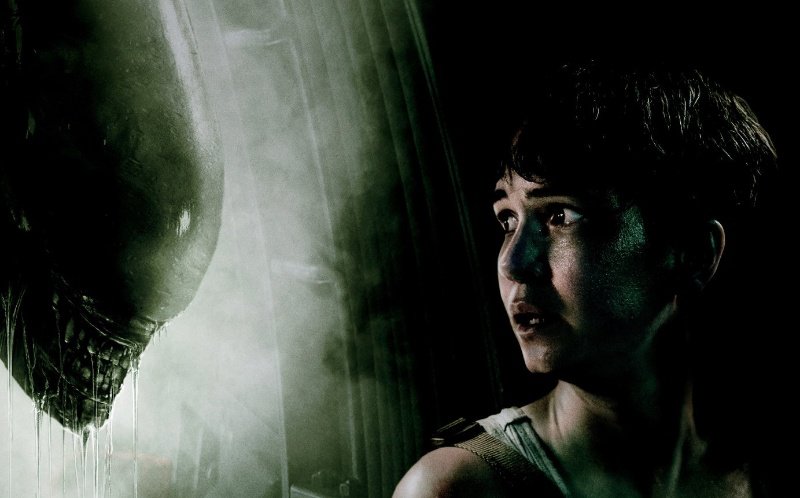
Within the first twenty minutes of Alien: Covenant, the audience is introduced to the main cast and crew of the Covenant, a colony spaceship en route to the Valhalla planet, Origae-6. The story unfolds ten years after the events of Prometheus, beginning with a spiritual discussion between Peter Weyland and his AI companion, Walter. Weyland muses existentially to Walter, citing a Divine blueprint for human beings to conquer the stars and meet their creators. He reveals that Walter's purpose is to serve humanity. Walter becomes skeptical, questioning why he should serve humanity when he is immortal, but Weyland tells him that it is his destiny to do so, just as it is humanity's purpose endlessly search for meaning in life.
The scene fades to Walter standing on board of the Covenant, working alongside Mother, the ship's computer, as the 2,000 colonists and crew hypersleep in pods, awaiting their arrival to their land of hope from extinction. But, there is trouble in paradise, and both Mother and Walter fail in predicting a storm that shakes the energy sails of the ship, emergency alarms blare throughout the craft, and the crew is woken up to disaster. Here, the movie is slowly setting up its themes, building upon both the first scene and Prometheus, showing that machines are subject to error, and humanity is not obsolete.
In a moment that should be pivotal to the development of the characters, this is where the movie lost its initial impact on me. One of their members dies; this member happens to be played by James Franco, but that is neither here nor there. His pod malfunctions, (again, we cannot always rely on technology to get the job done) and he explodes into an inferno as his wife screams in agony as the rest of the crew attempt to pull her away from the scene.
And... I felt nothing. But before you start thinking that I am a Xenomorph, I want you to consider why. Why, in a movie that is obviously heavy-handed in its plea towards the importance of humanity, does the first death miss its emotional mark?
The audience, although familiar with the Alien franchise, and presumably fans of the series, do not know the current cast of characters, and therefore have no connection to the events on the screen. Sure, we know that the two of them were married, and that is objectively sad, but we do not know their relationship, their dynamic, or the true feeling of loss experienced by the character left behind. The widow, Daniels, acts similarly to the other female Alien protagonists, but is not enough to sell the pathos or continue on the legacy of Ripley on looks alone.
I critique this aspect of the movie, not only because the first death reflects the rest of the deaths within the film, but to highlight an issue that is rampant throughout the current market of sequels, prequels, and remakes: recycled pathos. More specifically, trading notoriety for authentic setup and payoff. Dan, Film Studies aficionado and genuine cool guy, explains this concept better than I could, here. Stories can have more complicated, symbolic, or nuanced setup and payoff moments, but for the sake of Covenant, the lack of setup has to do with the relationships with the characters and the conflict that they feel. Without the proper setup, this conflict is more contrived than effective. In essence, we have no stake in the conflict, and the resolution is less rewarding because of it.
Convenant is not without its merits--it carries over the excitement and intrigue of the original films, and walking in the footsteps of Prometheus, makes the Xenomorphs even scarier in their new evolution. Not only are they parasites, but they are pathogens, and more imperious than ever before. The gore, the intensity, the rape allegory, the deep meditations on playing god--Covenant had it all. Yet, the cast of characters were forgettable. They were nearly all married, which made sense on account that it was a colony ship and they all wanted to start families and lives on a new planet, but they did not share any moments that fleshed out these roles. Danny McBride's wife dies, and he acts out his grief wonderfully, but there was nothing that connected the audience to their relationship. Similarly, the captain's wife dies in the same explosion, but they only shared one moment as she comforted him as he complained about the rest of the crew disrespecting his authority.
The most interesting dynamic in the film is between Michael Fassbender and himself. Walter meets the AI from Prometheus, David, who, if you remember, is pretty damn evil, and is plotting for humanity's destruction like a game run by a chaotic Dungeon Master, releasing the aliens unto them as a part of his vision of eugenics. Walter, aims to protect humanity, and unfortunately does not make it, and is replaced by David as Daniels escapes. Perfect opportunity for another sequel.
The original Alien movies are not replete with emotion, but in Covenant, there were eight more members of the crew (excluding Jonesie the cat) and much more emphasis on their interpersonal relationships. This is not just a sci-fi movie with a badass protagonist hell-bent on a revenge based on trauma, wielding a flamethrower, but a ship full of families and loved ones. The focus of the movie shifts as a result. Alien: Covenant is an exciting movie that attempts to delve into interesting topics such as creation, evolution, sexual assault, technology, and morality, but it falls short in its representation of the human relationships that it wants to protect.